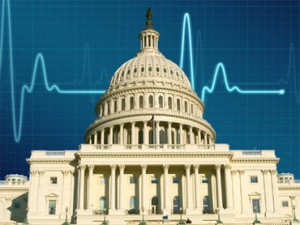Health Care Reform: On Life Support, But Not Dead Yet
On March 28, the Supreme Court wrapped up 3 days of oral arguments in what might be its most important case in decades. It just heard a challenge brought against the Patient Protection and Affordable Care Act, also known as the healthcare reform law we’ve been hearing about nonstop for the last two years.
 Now that we’ve gotten a small hint of what the justices think about the law, based on the questions they asked during arguments, what do we know? The only thing that’s completely certain is that we still don’t know how this is going to turn out. The court isn’t expected to rule on the case until sometime in June. But by all accounts, things didn’t go well for the Obama administration, which was defending the law.
Now that we’ve gotten a small hint of what the justices think about the law, based on the questions they asked during arguments, what do we know? The only thing that’s completely certain is that we still don’t know how this is going to turn out. The court isn’t expected to rule on the case until sometime in June. But by all accounts, things didn’t go well for the Obama administration, which was defending the law.
The law’s opponents probably shouldn’t pop the champagne just yet. But its supporters might want to have some whiskey on hand, come June.
One analyst described the proceedings as a “train wreck” for the Obama administration. Justice Kennedy, widely considered the swing vote on which the healthcare reform will stand or fall, asked the government’s lawyer some very pointed questions which seemed to betray his skepticism of the law’s constitutionality.
Before I go any further, here’s a very brief recap of the issues: the stated goal of the Affordable Care Act (ACA) is to increase the number of Americans who have health insurance coverage. There are several means by which Congress could have gone about achieving this goal. The method it chose is a so-called “individual mandate.” Basically, the law, when and if (and after today, that looks like a really big “if”) it goes into effect, insurance companies will be prohibited from turning away customers because of pre-existing conditions. But if this rule were in place by itself, it would simply encourage people to hold off on buying health insurance until they actually get sick, at which point their treatments would be covered. Obviously, this would either cause premiums to skyrocket, or insurance companies to simply go out of business.
So, to get around this problem, the law also requires almost all Americans to obtain health insurance (either through their employer, a government program, or buying it directly), or pay a tax penalty each year. The idea is that this would bring a large number of young and healthy people onto the insurance rolls. These people are very profitable to insure, because, on average, they don’t sustain nearly as many medical expenses as other populations. These increased profits would, in theory, offset the added expense of ensuring people with pre-existing conditions.
And this so-called “individual mandate” is the central issue of the constitutional challenge to the law. Basically, under the constitution, the federal government is one of enumerated powers, meaning that it can only engage in activity which is expressly permitted by the Constitution, and forbidden from doing everything else. One of the powers granted to Congress in the constitution is the power to regulate interstate commerce. Over the years, the Supreme Court has read this to mean that Congress can pass laws regulating almost any activity that has some conceivable effect across state lines. Given the interconnected nature of a modern economy, this gives Congress the power to regulate almost anything. However, Congress has never before required individual Americans to buy a product or service, as the ACA does. Although the powers of Congress under the Commerce Clause are broad, everyone agrees that they are not unlimited. Opponents of the ACA are now arguing that this is where we should finally draw the line.
And at the end of the third day of oral arguments, it appeared that at least 4 Supreme Court justices agreed with the opponents of the law, plus Justice Kennedy appearing to lean in that direction. The 4 liberal-leaning justices appeared firmly in favor of letting the law stand.
However, all is not lost for supporters of the ACA. While things aren’t currently looking good for it, there’s still a chance that it will be upheld. In his questioning of the government’s lawyer, Justice Kennedy seemed to hint that he might be open to analyzing the mandate under a stricter standard of review than other federal regulations. It would remain to be seen whether or not the insurance mandate would meet that standard.
And assuming that the individual mandate is overturned, there’s another question: does that mean the rest of the 2,000+ page law is also invalidated? Many laws contain a “severability provision,” stating that, if any single part of the law is declared unconstitutional, the rest of the law should remain in effect. The ACA, however, does not contain such a provision. So, the question the court has to consider is whether or not Congress would have passed the rest of the law
It seems pretty clear that, if the mandate is overturned, the prohibition on discrimination against people with pre-existing conditions would have to go as well, since it simply isn’t viable without the mandate. As to the hundreds of other provisions in the law, there’s a good chance that they’ll stand.
In the end, however, this is just me reading the tea leaves. We’ll find out this law’s fate in June, and I’ll be sure to keep you updated.

Comments